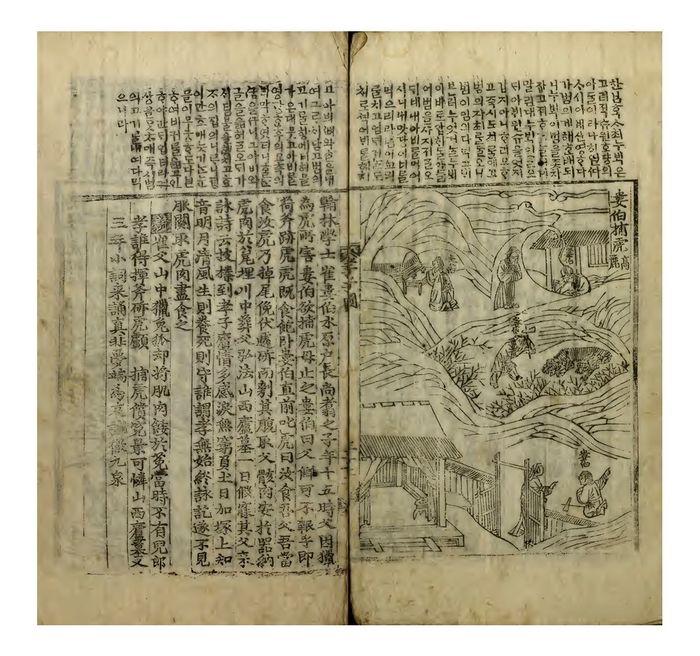"(Translation) 婁伯捕虎"의 두 판 사이의 차이
(→Translation) |
|||
| 9번째 줄: | 9번째 줄: | ||
|Year = 1434 | |Year = 1434 | ||
|Key Concepts= | |Key Concepts= | ||
| − | |Translator = [[2018 Hanmun | + | |Translator = [[2018 Summer Hanmun Workshop (Intermediate)#수강생 Participants | Participants of 2017 Summer Hanmun Workshop (Intermediate Training Group)]] |
|Editor = | |Editor = | ||
|Translation Year = 2018 | |Translation Year = 2018 | ||
}} | }} | ||
| + | |||
| + | __TOC__ | ||
| + | |||
=='''Original Script'''== | =='''Original Script'''== | ||
| 54번째 줄: | 57번째 줄: | ||
"He buried his father at the west slope of Hongbŏp mountain" To be precise, Nubaek performed a funeral for his father there. So perhaps "he buried his father with a funeral"? | "He buried his father at the west slope of Hongbŏp mountain" To be precise, Nubaek performed a funeral for his father there. So perhaps "he buried his father with a funeral"? | ||
| − | [[Category:2018 Hanmun | + | [[Category:2018 Summer Hanmun Workshop]] |
[[Category:Intermediate Training Group]] | [[Category:Intermediate Training Group]] | ||
2018년 7월 19일 (목) 08:16 기준 최신판
| Primary Source | ||
|---|---|---|
 |
Title | |
| English | [(Ch’oe) Nubaek captures the tiger | |
| Chinese | 婁伯捕虎(Nubaek p’oho) | |
| Korean(RR) | 누백포호 | |
| Text Details | ||
| Genre | ||
| Type | ||
| Author(s) | 偰循 (Samgang haengsil-to 三綱行實圖) | |
| Year | 1434 | |
| Source | ||
| Key Concepts | ||
| Translation Info | ||
| Translator(s) | Participants of 2017 Summer Hanmun Workshop (Intermediate Training Group) | |
| Editor(s) | ||
| Year | 2018 | |
Original Script
- 【詩】崔父山中獵兎狐。却將肌肉餧於菟。
- 當時不有兒郎孝。誰得揮斤斫虎顱。
- 捕虎償冤最可憐。山西廬墓又三年。
- 小詞來誦眞非夢。端爲哀誠徹九泉。
Translation
Student Translation : (Ewa)
Hanlin academician Ch'oe Nubaek was the son of Sangja, the chief of Suwŏn. When he was fifteen years old, his father was killed by a tiger during the hunting. Nubaek wanted to capture the tiger. His mother stopped him. Nubaek said: "How could I not revenge my father?" Then he put an ax on his shoulder and tracked the tiger. The tiger, with its stomach full, was resting. Nubaek stood in front and scolded the tiger: "You have eaten my father, I must eat you." The tiger just beat its tail, lying low on the ground. Nubaek swung the axe and cut the tiger’s belly open. Then retrieved from there the bones and flesh of his father, and placed them safely in an urn. He put the tiger’s meat in a jar which then he drowned in a river. He buried his father at the west slope of Hongbŏp mountain in a thatched tomb. One day, as if in a dream, his father came and intoning a poem said: parting the bushes I arrived at the mourning house of a filial son. He suffered greatly and shed many tears. Every day he carried more earth to put on the top. He knew how to call the bright moon and the light wind. He took care of me when I was alive and protected me after my death. Who says of filial love that it has no beginning and no end? He finished singing and disappeared. Having completed the mourning Nubaek retrieved the tiger’s meat from the river and ate it.
<Poem>
While Ch’oe, the father, was hunting hares and foxes in the mountain;
Instead, he fed his flesh to the great cat.
At that time, he did not have [by his side] the filiality of his son;
Who was there to hack the tiger’s skull with an axe?
Heartening is [the son] capturing the tiger to avenge;
Yet, in the west of the mountain, he kept vigil next to [his father’s] grave for three years.
The short poem [that His father] came to intone was not really a dream;
It is nothing else but his grief and sincerity piercing through the Nine Springs of the underworld.
- Discussion Questions:
(YO) 戶長 is a title for a chief yamen officer.
For "jar which then he drowned in a river," he buried the jar under the water.
"He buried his father at the west slope of Hongbŏp mountain" To be precise, Nubaek performed a funeral for his father there. So perhaps "he buried his father with a funeral"?